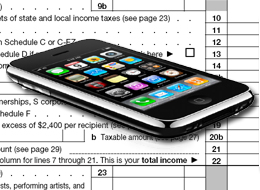[The following essay is a guest post from Dan Rothschild, Managing Director of the State and Local Policy Project at the Mercatus Center at George Mason University.]
 As cell phone ownership has tripled in the United States over the last decade, policymakers have increasingly seen mobile devices as a cash cow. In some states, consumers now pay as much as a quarter of their cell phone bills in taxes. And while state revenues are beginning to tick back up from their low point during the recession, Medicaid costs are fast on their tails. So it’s likely that over the coming years, states will be looking to find taxes to hike or new taxes to create — all without calling them tax hikes, of course.
As cell phone ownership has tripled in the United States over the last decade, policymakers have increasingly seen mobile devices as a cash cow. In some states, consumers now pay as much as a quarter of their cell phone bills in taxes. And while state revenues are beginning to tick back up from their low point during the recession, Medicaid costs are fast on their tails. So it’s likely that over the coming years, states will be looking to find taxes to hike or new taxes to create — all without calling them tax hikes, of course.
Policy makers may be tempted to hike taxes on cell phones, or to create (or “equalize”) taxes on untaxed (or “under taxed”) parts of wireless telephony, such as cell phone data plans or e-readers with cellular connections. As I argue in a recent issue of Mercatus on Policy, this is a bad idea for a number of reasons.
First, it’s bad economics. Having special taxes on cell phone violates the well-established principle of tax neutrality, which holds that taxes should treat all economic activities similarly. The purpose of taxes is to raise funds for necessary government services; when taxes treat different activities unequally, it distorts consumer behavior. Empirical evidence suggests that, at the margin, consumer spending on wireless service is elastic. This makes it a particularly poor choice for excise taxation.
There are two economic justifications for a tax that singles out a particular good or service for a higher tax: if it’s something that policymakers deem “sinful” (a so-called “sin tax”), or if it causes negative externalities that the tax corrects (a Pigouvian tax). In both of these cases, policymakers enact these taxes explicitly to discourage the use of the object of the tax; think cigarettes and alcohol. Neither of these rationales apply to cell phones, and (hopefully) no policymaker believes it’s a worthy policy to reduce consumer access to this technology. Nobody seriously argues that cell phones are sinful, nor that cell phones create net negative externalities.
Second, it runs counter to a number of other policy goals. On the national level, politicians are tripping over themselves to extoll the virtues of broadband internet access and its almost magical effects on everything from health outcomes to urban entrepreneurship. But taxing wireless service, which is frequently bundled with wireless broadband, runs counter to that goal (as would any attempts to “equalize” taxes between the voice and data sections of a bill by applying voice tariffs to data services). Similarly, the FCC’s universal service fund is meant to, inter alia, support telephone access in low-income and rural households. The most efficient way to increase take-up of telephony in these households is to lower the price rather than relying on notoriously inefficient subsidies.
Third, it’s a regressive tax. In all likelihood, cell phones are taxed at a higher rate because not so long ago they were seen as toys of the wealthy. This is obviously no longer the case. The marginal consumers today are largely lower-income, and high taxes keep them from adopting technologies.
On the federal level, the Wireless Tax Fairness Act would prohibit states and localities from “imposing a new discriminatory tax on cell phone services, providers, or property.” This is probably a step in the right direction, though it still leaves (from my reading) loopholes for states. For instance, states could argue that they are not imposing a new tax if they applied the same taxes on wireless voice products to wireless data products. This could allow them to easily slap monthly fees on Kindles, iPads, and other devices that use cellular networks. In many ways, this would be more pernicious than raising taxes on voice products.
The bottom line is that taxes on cell phones are inefficient, inequitable, and run counter to other public policies. They likely cost more in lost consumer welfare than they collect in revenues. There’s no reason for them, and states looking to improve their tax structure could do well by eliminating them altogether.

 The Technology Liberation Front is the tech policy blog dedicated to keeping politicians' hands off the 'net and everything else related to technology.
The Technology Liberation Front is the tech policy blog dedicated to keeping politicians' hands off the 'net and everything else related to technology.